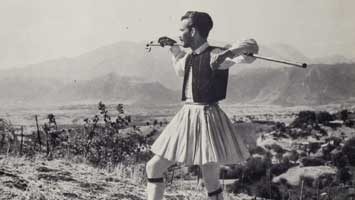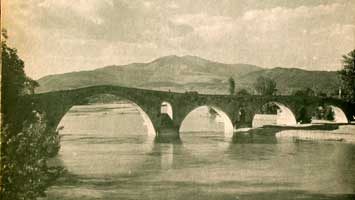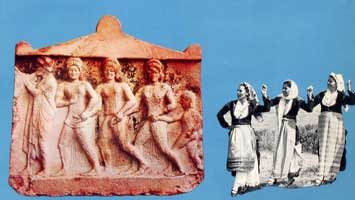“Musical Travelogue with Domna Samiou” (“Musiko Odiporiko me ti Domna Samiou”) was a television series researched and presented by Domna Samiou and broadcast by Greek National Television in 1976-1977. Each episode was dedicated to the music and dance tradition of a different area of Greece.
In Rethymno, Domna meets the famous musician Stelios Foustalieris or Foustalierakis. Foustalieris plays the boulgari, a musical instrument that belongs to the family of the tambur, one of the most popular musical instruments of the Greeks. He is perhaps the only musician who plays this instrument today.
He sings the song The Sufferings I Rejoice and plays the tunes Syrtos First and Syrtos of the Night. He informs us about his acquaintance with the boulgari, how old recording studios operated, the types of songs he recorded and his primary occupation which is watchmaking.
Syrtos Dance of Chania
Stelios Foustalierakis (Foustalieris), boulgari. Rethymno 1977
TV program “Musical Travelogue with Domna Samiou”
Syrtos of the Night
Stelios Foustalierakis (Foustalieris), boulgari. Rethymno 1977
TV program “Musical Travelogue with Domna Samiou”
Discussion with Stelios Foustalierakis
Stelios Foustalierakis (Foustalieris). Rethymno 1977
TV program “Musical Travelogue with Domna Samiou”
In the old town of Rethymno, at the market place, in a small tavern (rakadiko) that serves raki*, Charalambos Anagnostakis plays the lyra and sings accompanied by his customers. As appetizers, the taverna owner offers baked potatoes, small olives and soaked broad beans.
I wish I had a glass of raki and four roasted chickpeas
And you will see how lovely I would sing …
* Tsikoudia or Raki: Homemade alcoholic beverage distilled from the by-products of winemaking or berries
Mandinades for the Raki
Song Charalambos Anagnostakis & Group of Men, Charalambos Anagnostakis, Cretan lyra. Rethymno 1977
TV program “Musical Travelogue with Domna Samiou”
Andreas Rodinos (1912-1934) was one of the most famous and beloved lyra players in Crete. His name has become a legend among younger musicians. The lyra player, Antonis Papadakis, 86 years old today, known by the nickname Kareklas, knew Rodinos and composed couplets about his untimely death.
A Song for Rodinos
Antonis Papadakis (Kareklas), song & Cretan lyra. Rethymno 1977
TV program “Musical Travelogue with Domna Samiou”
The Sousta Dance from Rethymno is danced by couples and has taken the form of a love dance, similar to the Balos Dance of the Aegean islands. It is danced by a group led by Yannis Stavridakis.
Sousta Dance from Rethymno
Gerasimos Stamatoyannakis, Cretan lyra, Thanassis Pachakis, lute. Rethymno 1977
TV program “Musical Travelogue with Domna Samiou”
Manolis Stagakis is one of the well-known Cretan lyra makers in Rethymno. Domna Samiou meets him in his workshop and interviews him about his craft.
Discussion with Manolis Stagakis
Manolis Stagakis. Rethymno 1977
TV program “Musical Travelogue with Domna Samiou”
In the cafe of Krya Vrysi, residents dance Pentozalis. Petros Leventakis plays the lyra, sings Mandinades and is accompanied on the lute by Manolis Veridakis. Krya Vrysi is one of the seven villages burned down and demolished by the Germans on August 22, 1944 in retaliation for the kidnapping of the German General Kreipe.
My glorious Krya Vrysi with your many waters
everyone has heard about your accomplishments.
Mandinades for Love
Petros Leventakis, song & Cretan lyra, Manolis Veridakis, lute. Rethymno 1977
TV program “Musical Travelogue with Domna Samiou”
In Anogia, Giorgis Manouras, also known as Gero-Kourkoutis or Kourkoutakis, sings and plays with his lyra Mandinades and the historical Song of Nida. The song refers to the legal dispute between Anogia and Vorizia (of the Heraklion district), over the occupation of the Nida plateau in 1870.
Mandinades
Giorgis Manouras, Cretan lyra & song. Anogia, Rethymno 1977
TV program “Musical Travelogue with Domna Samiou”
The Song of Nida
Giorgis Manouras, Cretan lyra & song. Anogia, Rethymno 1977
TV program “Musical Travelogue with Domna Samiou”
The mandinades that are sung using the tune of the slow Pentozalis are called Mandinades Chimatikes. Aristidis Heretis and Costas Heretis sing Mandinades Chimatikes, and later, a group of five men dance the Anogianos Pidichtos (Pidichtos dance from Anogia).
Mandinades (Chimatikes)
Song Aristidis Cheretis, Kostas Cheretis. Kostas Cheretis, Cretan lyra, Yannis Petrakis, lute. Anogia, Rethymno 1977
TV program “Musical Travelogue with Domna Samiou”
Anogianos Pidichtos
Kostas Sifakis, Cretan lyra, Stelios Sifakis, lute. Anogia, Rethymno 1977
TV program “Musical Travelogue with Domna Samiou”
Alkiviadis Skoulas or Grilios, a self-taught folk painter and sculptor, lives in Anogia. A former shepherd, presently 76 years old with 9 children and 30 grandchildren. Six years ago he decided to get involved in wood carving and painting. He tells Domna Samiou how an incidental encounter with a tailor in Heraklion caused him to start painting and how a log that looked like a head became the reason to start wood carving.
Discussion with Alkiviadis Skoulas
Alkiviadis Skoulas. Anogia, Rethymno 1977
TV program “Musical Travelogue with Domna Samiou”
Credits
Research and presentation: Domna Samiou
Director: Andreas Thomopoulos













